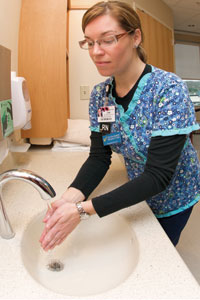Silent observers find 100 percent hand washing compliance on six hospital units

Hand washing, one of the most crucial practices for fighting hospital infections, reached 100 percent compliance on six nursing units over six months in 2011.
Christiana Care staff “silent observers” found no exceptions from January through June on 5E, 5D, 4D, 7E and TSU at Christiana Hospital, and on Wilmington Hospital’s Unit 3 West.
Hand hygiene consistency was a key factor behind an 11 percent reduction in the number of patients placed at harm this year, said Bob Laskowski, M.D., MBA, president and CEO of Christiana Care, during a biannual presentation to the Christiana Care Board of Trustees in November. That’s a full percentage point ahead of the year-end goal of 10 percent.
Clean hands prevent the spread of common illnesses—such as the cold—as well as more serious diseases such as hepatitis A, meningitis, the flu and infectious diarrhea.
“When you have a large number of isolation patients as we do, it becomes more and more of a challenge to protect them from infections,” says Beth Rathmanner, RN, 5E nurse manager. “Very rarely do we ever drop,” she says, despite being a relatively large (30-bed) unit running at capacity almost every day. The unit cares for heart failure and cardiac patients—a large percentage of whom have co-morbidities—with a typical age range of 75 to 79.
One-hundred-percent-compliant hand hygiene practices observed on 4D—a 35-bed surgical stepdown unit—have been recognized both internally and nationally. The unit’s increased hand washing rates were linked to a drop in C. difficile rates by 50 percent. The staff’s dedication earned the Nursing – Structural Empowerment Award at the Focus on Excellence Awards program in December. The unit’s Quality and Safety Council accepted the award for its hand hygiene campaign, which included innovative handwashing games and a catchy music video, “Get Your Clean On,” which placed third in an infection-prevention video contest sponsored by 3M.
“We had staff buy-in from the very beginning,” says 4D Nurse Manager Karen McCloud, RN. “For the video, they wrote the music, sang and danced for it. When you have that kind of buy-in, you’re going to follow through with a high compliance rate. Every member at every level of our unit bought into improvement.”
On Unit 3W at Wilmington Hospital—the psychiatric unit—patients generally don’t face the same serious medical conditions as other units, says Nurse Manager Marge Bailey, RN. But the importance of handwashing has been so instilled in the culture there that they too received 100 percent compliance.
“I don’t think our thoughts are any different than if we were working on a med-surg unit,” Bailey says. “Everywhere in a hospital there’s a potential for the transmission of disease. Even if patients are healthy, we still are worried about transmission.”
The two dozen health care workers on the psychiatric unit also take measures to encourage hand washing among the patients. In the joint dining hall, for example, the mental-health associate monitoring the meals ensures that all the patients gel their hands before eating.
Letting people know when they neglect to wash their hands before entering a patient’s room is another key to reaching the gold standard, says Jennifer Johnson, nurse manager of Christiana Hospital’s Unit 7E, a spine surgical and bariatric unit with a 100 percent handwashing compliance record, where nurses and patient-care technicians don’t hesitate to remind surgeons about hand washing if they forget, and vice versa, Johnson says.
“Everyone makes mistakes, but if we see someone who forgets to wash their hands we do point it out,” she says.